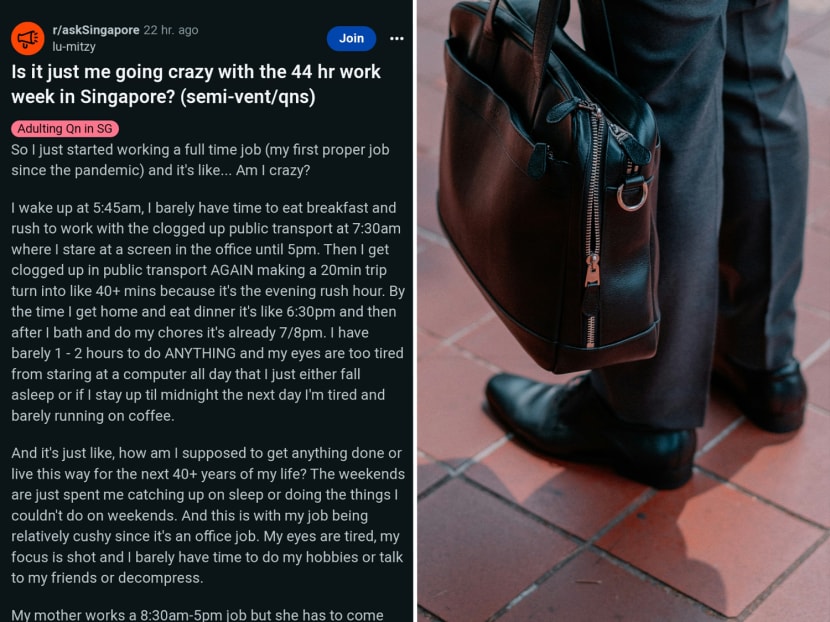#trending: 'Is it just me going crazy?' Junior employee in Singapore questions culture of working 44 hours a week
#trending: 'Is it just me going crazy?' Junior employee in Singapore questions culture of working 44 hours a week

- An online user expressed frustrations about Singapore's 44-hour work week, highlighting the demanding routine and lack of personal time
- The post resonated with many others who shared similar experiences of adjusting to the demands of adulthood and the workforce
- While some defended the typically long work hours as part of the real world, others acknowledged the need for a cultural shift towards better work-life balance
SINGAPORE — In Singapore’s fast-paced and highly competitive society, working an average of 44 hours a week has been a part of its culture.
For new employees just stepping into the workforce, adapting to long hours may prove daunting and raise questions about work-life balance.
On Sunday (March 17), someone went on online forum Reddit to express frustrations about Singapore’s work culture.
The Reddit user “lu-mitzy” wrote: “So I just started working a full-time job (my first proper job since the pandemic) and it's like... am I crazy?”
The person went on to describe a relentless routine that begins with an early wake-up call at 5.45am, and having to rush through breakfast before navigating “clogged” public transport to reach the office by 7.30am.
The day is then spent “staring at a computer screen” until 5pm, only to face the same congested commute home, turning what is supposed to be a short 20-minute trip into a prolonged ordeal due to the evening rush hour.
By the time the person reaches home and has dinner, it is 6.30pm. And with chores needing to be done, the Reddit user claimed that it leaves barely any time for personal pursuits or relaxation before the cycle repeats itself.
Weekends are mostly spent catching up on sleep or doing things that could not be done during the work week, the person said, adding that there is hardly time to indulge in hobbies, socialise with friends or even “decompress”.
The user then talks about the added strain that comes with the Government’s expectations for its citizens to continually "upskill" and pursue romantic relationships on top of already demanding work schedules.
“Is this just the Singaporean way of life? I'm so lost. Is there some trick every working Singaporean adult knows that I'm just missing out on?... There's no way this is sustainable?” the job-starter questioned.
In less than a day, the discussion thread had received more than 1,300 upvotes and 450 comments as of Monday afternoon.
‘WELCOME TO ADULTHOOD’
The worker's post seemed to resonate with many fellow Reddit users who told of their own experiences of grappling with the demands of a typical 44-hour five-day work week, especially as a new hire.
One user wrote: “Yes, welcome to adulthood. I had the same shock as a fresh graduate realising this is how the next 40 years of my life is going to play out.”
Another said: “The first job after graduating always hits hard. In school, there are milestones to look forward to (such as holidays, exams, graduation) but work is just endlessly stretching on.”
Some readers claimed that things would get better over time: “Honest answer is that most people just get used to it after a while because a job is what puts bread on the table. People learn to streamline or minimise chores to save time.”
“The culture is crazy, and this needs to change. The mindset needs to change from ‘live to work’ to ‘work to sustain a living’.Reddit user "Effective_Airline_87"”
A handful of users, however, accused the person of being “naive” for even complaining about working 44 hours a week.
One pointed out: “I work like 60 hours a week, have a baby, and am enrolled in a graduate programme. 44 isn’t bad.”
Another user commented: “Welcome to the real world? 44 hours isn’t even a lot. You’re in for a rough awakening.”
Nonetheless, several readers assured the new worker that it is not “crazy” to find Singapore’s work culture difficult, giving advice that a re-evaluation of practices was due.
One wrote: “You're not crazy. The culture is crazy, and this needs to change. The mindset needs to change from ‘live to work’ to ‘work to sustain a living’. Or at least give people a choice in that regard.”
Reddit users also offered the worker some advice to achieve better work-life balance, such as going for a workplace that is closer to home, looking for a position that allows for some remote work or ideally, a job role that is fulfilling.
It seems like the shock of transitioning into the professional world is a universally shared experience for new employees such as the Reddit user.
In October last year, a fresh graduate in the United States named Brielle Asero took to social media to rant about the challenges of adapting to a demanding nine-to-five work routine while maintaining a personal life. Ms Asero’s TikTok video went viral, receiving both sympathetic and critical responses from viewers.
Surveys, such as one done by TODAY focusing on youth, have revealed an increasing desire in Singapore for a reduced work week.
However, the enthusiasm for this arrangement comes with reservations, with some polls showing that workers were concerned about the manner of its implementation.
In September 2022, Ms Gan Siow Huang, Minister of State for Manpower, said that the Ministry of Manpower and its partners “strongly encourage employers and employees to be open to flexible work arrangements” to best meet their respective needs, including a four-day work week.
